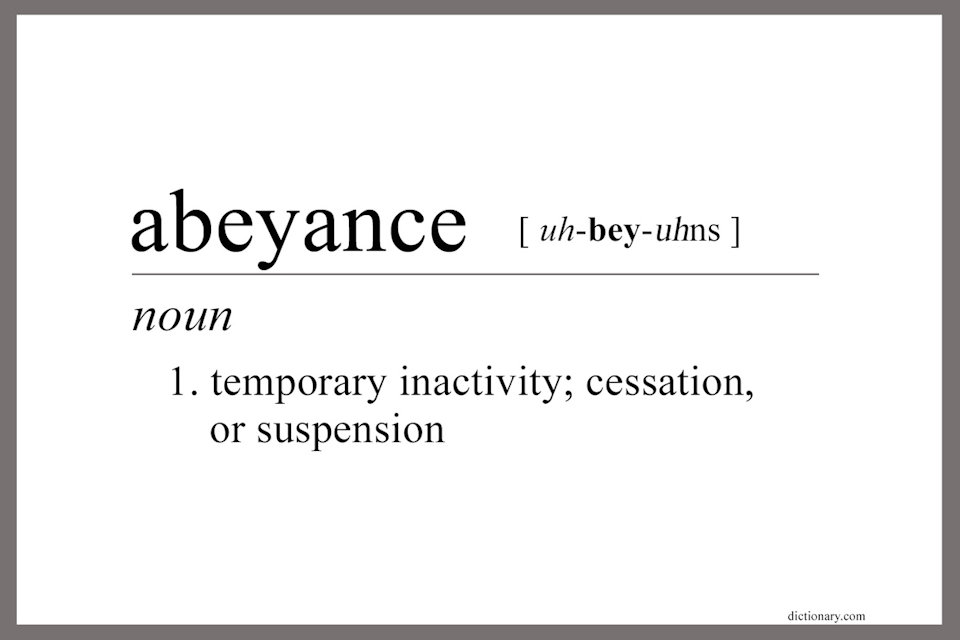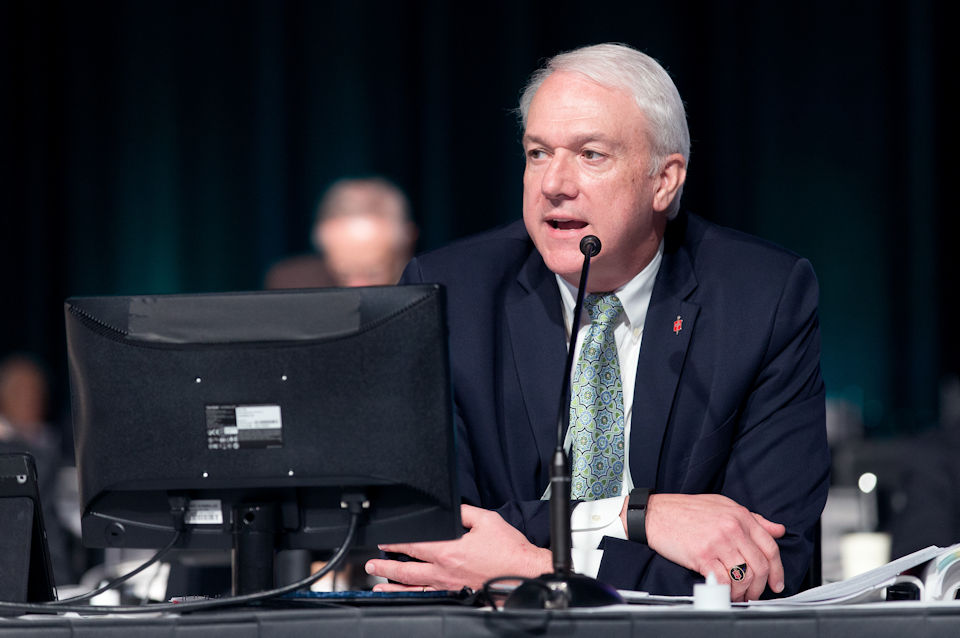“We need to settle ourselves down and breathe and allow the breath of God to take us to this next stage,” said Bishop Thomas Bickerton, regarding complaints and church closings.
HEATHER HAHN
UM News
With The United Methodist Church’s future up in the air, now might be a good time to take a breath.
Bishop Thomas Bickerton said that’s why he and the 15 other church leaders who negotiated the proposed “Protocol of Reconciliation & Grace Through Separation” agreed to put a hold for now on two of the most fraught situations in the church.
Specifically, the mediated agreement calls for:
- Holding in abeyance complaints related to the denomination’s bans on same-sex weddings and “self-avowed practicing” gay clergy.
- Delaying church closures unless a church is financially insolvent.
“We need to settle ourselves down and breathe and allow the breath of God to take us to this next stage,” said Bickerton, who also leads the New York Conference.
The Rev. Keith Boyette, president of Wesleyan Covenant Association and a protocol signer, echoed that sentiment. He and other traditionalist leaders have long advocated for upholding church restrictions. Nonetheless, Boyette agreed to the hold on complaints.
“In a highly charged, conflicted situation, anything that can lower the temperature in the environment assists in creating a scenario where resolution can be achieved,” he said.
“In a highly charged, conflicted situation, anything that can lower the temperature in the environment assists in creating a scenario where resolution can be achieved.” ~ Rev. Keith Boyette
The agreement, at this point, is not binding on anyone but the 16 signers. However, Bickerton and other signers hope that United Methodists across the theological spectrum will embrace the two provisions.
Bishop LaTrelle Easterling, the protocol signer who leads the Baltimore-Washington Conference, was the first to announce publicly her intent to abide by the abeyance. She asked church members to read the protocol “with an eye toward an opportunity to pour ourselves into mission and ministry without fear of LGBTQIA+ charges, trials or exclusion.”
In general, bishops — who are frequently the first stop for complaints under church law — have met the request with mixed responses.
On January 3 Bishop David Bard, Michigan Area, addressed this key facet of the proposed separation plan saying, “As an early advocate for a moratorium on complaints regarding LGBTQ clergy and same-sex weddings as part of a larger agreement on the future of the UMC, I intend to follow the direction of the protocol in holding in abeyance ‘all administrative or judicial processes addressing restrictions in the Book of Discipline related to self-avowed practicing homosexuals or same-sex weddings beginning January 1, 2020, through the adjournment of the first conference of the post-separation United Methodist Church.”
Bishop Bruce R. Ough, who leads the Minnesota and Dakotas conferences, wrote that he would honor the recommended abeyance and urged other United Methodists to join him by “voluntarily ceasing the filing of complaints.”
Bishop Sharma Lewis, who leads the Virginia Conference, offered a different message. She urged her conference’s clergy not to officiate at same-sex weddings. “However, if clergy preside over same-sex weddings and a complaint is filed about such conduct, I will process the complaint,” she wrote.
For those who negotiated the protocol, hitting the pause button on complaints and closings was “absolutely essential for the mediation to succeed,” Bickerton said.

The protocol is the result of discussions that brought together eight bishops and eight advocacy group leaders from divergent perspectives on LGBTQ inclusion. Working with renowned mediator Kenneth Feinberg, the group developed a plan that allows traditionalist congregations and conferences to separate and form a new denomination while keeping their properties and getting $25 million in United Methodist funds.
The plan is still being drafted as legislation for the 2020 General Conference, set for May 5-15 in Minneapolis. Other plans for denominational separation or restructuring also have been submitted for consideration by the church’s top lawmaking body.
The protocol stands out in that its developers include a broad, influential coalition of leaders on opposing sides in the homosexuality debate as well as leaders from the Philippines, Europe, and Africa.
The mediation involved give and take. Boyette said he and his fellow traditionalists specifically wanted the delay on church closings until after General Conference 2020 in exchange for the abeyance.
“In some annual conferences, there is concern that churches of one theological perspective or the other are being targeted for closure to either harm or help a particular perspective,” Boyette said.
The Rev. David Meredith, another protocol negotiator, said the complaint abeyance was especially important for him.
Meredith, the senior pastor of Clifton United Methodist Church in Cincinnati, Ohio, has been under complaint since 2016 after he married his longtime partner, Jim Schlachter. Bishop Gregory V. Palmer, who is Meredith’s bishop, also signed onto the protocol.
But Meredith said it was not the complaint he faced that made him push for the abeyance.
“It’s a form of relief that can start now,” he said, “to say to the entire denomination that if we really are going to separate and try to be two distinct new denominations, then we can start now by not hurting people anymore.”
The abeyance may already be having an effect.
The Rev. Austin Adkinson, one of the conveners of the United Methodist Queer Clergy Caucus, said he and other openly LGBTQ clergy expected “a wave of complaints” shortly after Jan. 1. That’s when new church rules aimed at strengthening the church’s LGBTQ restrictions took effect in the U.S.
But, so far, Adkinson is not aware of any new complaints. He still stressed caution. The abeyance “holds no weight for people outside the conferences whose bishops signed the protocol,” he said.
“In the mediation team, we coined the phrase: ‘How do we bless and send, rather than fight and rend?’” ~ Bishop Thomas Bickerton
At present, there are at least three open complaints related to the denomination’s rules on LGBTQ ministry. In addition to Meredith, two United Methodist elders who officiated at same-sex weddings in 2019 face possible church judicial action.
One of those pastors, the Rev. Andy Oliver, is a member of the Florida Conference led by Bishop Kenneth Carter, one of the protocol signers. Even before the protocol agreement, Carter — president of the Council of Bishops — suggested a moratorium on church trials related to LGBTQ restrictions.
“I am operating under the assumption that the complaint is now in abeyance,” Oliver said.
The other pastor under complaint is the Rev. Drew Ensz, director of campus ministry at George Mason University in Virginia. Bishop Lewis, who announced her plans to process complaints, leads his conference.
Ensz said he knew the risks when he agreed to officiate at the wedding of one of his former confirmation students.
“I was not willing to say no to someone who I stood across and asked whether they would stand up and ‘resist evil, oppression, and injustice in whatever form they present themselves,’” Ensz said. “I was not willing to then just put my head down and ignore those calls myself in my baptismal vows.”
Nevertheless, he said, after the protocol went public, he hoped the abeyance would apply in his case. The complaint against him, he said, is heading to a counsel for the church — essentially the United Methodist equivalent of a prosecutor.
Even amid the uncertainty about the less-than-comprehensive abeyance, a group that’s part of the Resist Harm effort — which opposes LGBTQ restrictions — aims to make marriage rites available to same-gender couples.
For now, Bickerton said, the main goal of the abeyance is to provide some peace as United Methodists seek to discern their future.
“In the mediation team, we coined the phrase: ‘How do we bless and send, rather than fight and rend?’” Bickerton said. “It’s a very important phrase for us because it’s just this acknowledgment that some of us are going to be going in different directions.”
Last Updated on October 31, 2023

